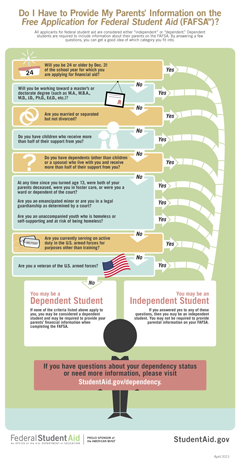Dependency Override Review
A Dependency Override generally can be CONSIDERED for an otherwise dependent FAFSA applicant if one or more of the following conditions exist and are documented by the applicant: opens PDF file
opens PDF file
-
An emotionally or physically abusive, unhealthy, or unsafe family environment exists.
-
Abandonment or neglect of the student by the parent(s) has occurred.
-
The custodial parent(s) is incarcerated.
-
The student has been removed from the parent(s)’ residence by court order.
-
Other unusual or extraordinary circumstance, events, or incidents, particularly ones related to any of the seven automatic conditions for independency listed on the FAFSA.
-
Circumstances documented in police reports or court orders.
In accordance with the U.S. Department of Education, a dependency override cannot be approved for an otherwise dependent financial aid (FAFSA) applicant if the following conditions are the only circumstances cited by the applicant:
-
Student claims financial self-sufficiency.
-
A parent is UNWILLING to contribute financially toward the student’s educational and living expenses.
-
A parent is UNWILLING to provide information required on the student’s FAFSA or to assist in completing the Verification process.
-
A parent DOES NOT claim the student as a federal income tax exemption.
-
You and your parents have disagreements resulting in a strained relationship.
REQUIREMENTS
To be considered for a dependency override, you must:
- Complete a FAFSA.
- Complete a Dependency Override Review form (Important Forms).
- Submit a personal statement describing your circumstance.
- Submit a signed copy of your IRS Tax Return or IRS Tax Return Transcript.
- Provide statements from two adult professionals* who can verify the family circumstances described in your personal statement.
*Professionals may include clergy members, attorneys, school counselors, medical doctors, mental health professionals, law enforcement officers, Department of Child and Family staff, and officers of the court. Letters must be on agency letterhead and signed with a professional title specified. Statements from family members or friends are not acceptable.
When you have all required documentation, you may schedule an appointment to meet with a financial aid administrator by using the Online Appointment Request Form.
Updated: 06/17/2021

